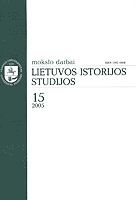IMMANUELIO WALLERSTEINO KAPITALISTINĖS PASAULIO SISTEMOS TEORIJA
IMMANUEL WALLERSTEIN’S THEORY OF THE CAPITALIST WORLD-SYSTEM
Author(s): Darius ŽiemelisSubject(s): History
Published by: Vilniaus Universiteto Leidykla
Summary/Abstract: One of the most significant tendencies in the development of Western historiography and social sciences in the last three decades has been the consolidation of a new multidisciplinary field of inquiry, comparative historical sociology (CHS). Reinhard Bendix, Chalres Tilly and Immanuel Wallerstein can be considered parents / creators of CHS in the U.S.A Theory of the Capitalist World System (CWS), initiated by the American sociologist and historian I. Wallerstein (b. 1930), who started his career researching on the contemporary history of Africa, is one branche of the CHS. This theory was formulated in opposition to Euro-centrism which is characterized by a belief in the endless (linear) progress of European civilization and which discounts other (non-European) cultures. Wallerstein’s popularity and influence in Western social sciences reached its zenith in 1970 and 1980, so that while perhaps coming late in the game, nonetheless knowledge and acquaintance with the ideas of this author can be useful for the conceptual renewal of modern Lithuanian historiography and for the investigation of problems in the socio-economic history of Central and Eastern Europe. The main strength of the CWS’s approach is possibility to expand the historical thinking to regional and global perspective in reply to the challenges facing social, political and geopolitical reality and to interpret history of every region in the historical context of local and world (meta) civilization. The main objectives of this article are: 1) to clarify the methodological traits and sources of the CWS’s theory; 2) to reconstruct retrospectively the development of the CWS’s theory in the works of Wallerstein (from the 16th to the second half of the 19th c.); 3) to discuss the critique and recept of CWS’s theory.
Journal: Lietuvos istorijos studijos
- Issue Year: 2005
- Issue No: 16
- Page Range: 65-81
- Page Count: 17
- Language: Lithuanian

